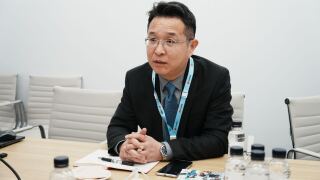Life as we know it is changing, quickly. In every area of human activity – whether communication, manufacturing, education or business processes – there has been an ongoing and rapid transformation. Nowhere is that clearer than in the telco business, where a new era of global connectivity has already begun, and where innovation is key to staying relevant. With this in mind, Deutsche Telekom has taken steps to reinvent its international wholesale business and more swiftly react to fast-changing requirements through streamlined processes, greater collaboration and heightened flexibility.
Rolf Nafziger, senior vice president for the International Wholesale Business Unit (IBU) at Deutsche Telekom, explained why the changes were implemented and how these tie in with long-term aims. “As a global wholesaler, we understand that dealing with the challenges of a radically evolving industry while maintaining our position as innovation leader requires a shift in our mindset and way of operating. We need to quickly adapt to change, implement digitisation and simplify processes. Along with those goals came the realisation that benefits could be gained by consolidating our wholesale structure and, with it, some ways of doing business.”
Promoting innovation through cultural upheaval
To foster innovation within company ranks, Deutsche Telekom aspires to instil a culture that embraces change, encourages ownership and supports collaboration. Nafziger noted: “Every single individual has the potential to make significant advances in the area they work in. We want to make it possible for everyone to contribute by asking people to try out their ideas, even if it sometimes leads to short-term failure.” He also praised the advantages of working together to more quickly develop innovations, whether between colleagues or at an industry-wide level.
Nafziger highlighted one collaborative project as a solid example of Deutsche Telekom’s status as an innovation leader: the European Aviation Network (EAN). This one-of-a-kind service provides reliable, high-quality broadband access to airline passengers flying across Europe. Together with Inmarsat, DT was the main partner on the project, which combines an S-band satellite from Inmarsat with DT’s ground-based LTE component. The European Aviation Network was specifically designed to meet the requirements of the European market, which has a large number of short-haul flights that demand high capacity and robust connectivity.
Creating worth through digitisation
Deutsche Telekom’s international wholesale unit plans to take advantage of big data and artificial intelligence to optimise flexibility and transparency. Nafziger believes that digitising daily business operations will allow the company to offer standard and enhanced services while at the same time simplifying practices. For clients, that will translate to shorter lead times, from ordering to delivery and implementation. Having a faster and clearer overview will also mean that the organisation will be able to adapt products and solutions to fit the changing needs of clients and know in advance which areas could hold major growth potential.
What the future holds
Deutsche Telekom already has over a decade of experience in the internet of things (IoT), as well as the A2P area. That proficiency puts the company at a great advantage over competitors, many of which are just beginning to look into these fields. Nafziger said: “For the future we see a lot of potential in IoT and have already begun several partnerships to provide new services. We’ve also launched several unique solutions to protect against SMS fraud. This is especially relevant in light of the growth A2P is expected to see in the next few years.” In addition, DT’s IPX platform is being continually enhanced, which will pave the way for unfolding technologies such as M2M or 5G.
Nafziger said work will be continued on innovations already on the market, with a large focus on security. Last year, the company launched its 360° Defense Strategy, which offers a broad range of safety solutions encompassing DDoS, fraud, SMS, SS7 protection and more. Nafziger added: “Of course, there will be technology changes which we can’t predict at the moment. That is why automation and digitisation, along with a flexible mindset, will be so important to helping us meet future challenges.”




